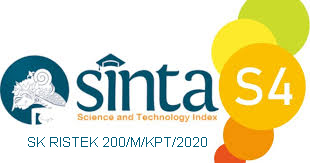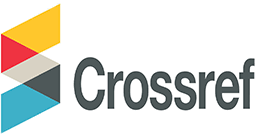Website System Design Using Agile Kanban Based On QR Code
Abstract
Business developments that occur today cannot be separated from the role of technology and information systems. The system that will be discussed in this journal is a Web-based Restaurant System that uses a QR code. This system will handle at least 5 types of users, namely admin, waiter, chef, cleaning service, and customers where the five kind of users have different access rights. Restaurant information systems using this QR Code can speed up performance in ordering menus, serving ordered dishes, paying bills to customers and cleaning tables after use. The use of the QR code itself is very suitable in the restaurant business and marketing practices because of its advantages, namely being mobile fried and easy to get information. This will improve the quality of the restaurant in terms of service and time. This Web-Based Restaurant Menu Ordering Application is designed using web programming languages, namely PHP. For the database, it will use MySQL and the system development method will use the Agile Kanban method which can help an organization produce software that has been tested and is ready to use. The results of the system design will be in the form of a comparison table for the old and new systems depicted by the PIECES table, then UML for system modeling, and website interface. The system created will help in reducing the amount of paper used for order receipts. In addition, users can also order menus during the COVID-19 pandemic with restaurants that use this system.
Keywords
Full Text:
PDFReferences
H. N. Saturwa, S. Suharno, and A. A. Ahmad, “The impact of Covid-19 pandemic on MSMEs,” J. Ekon. dan Bisnis, vol. 24, no. 1, pp. 65–82, Mar. 2021, doi: 10.24914/JEB.V24I1.3905.
W. Zendrato, “Gerakan Mencegah Daripada Mengobati Terhadap Pandemi Covid-19,” J. Educ. Dev., vol. 8, no. 2, pp. 242–248, May 2020, Accessed: Nov. 13, 2021. [Online]. Available: http://journal.ipts.ac.id/index.php/ED/article/view/1689
The Lancet Respiratory Medicine, “COVID-19 transmission—up in the air,” Lancet Respir. Med., vol. 8, no. 12, p. 1159, Dec. 2020, doi: 10.1016/S2213-2600(20)30514-2.
J. Caroline El Fiorenza, A. Chakraborty, R. Rishi, and K. Baghel, “Smart Menu Card System,” Proc. 3rd Int. Conf. Commun. Electron. Syst. ICCES 2018, pp. 847–849, Oct. 2018, doi: 10.1109/CESYS.2018.8724045.
F. FAISAL and M. A. F. ANAS, “PEMANFAATAN KODE QR PADA PENINGKATAN PELAYANAN DAN KEPUASAN PELANGGAN PADA RESTORAN,” J. INSTEK (Informatika Sains dan Teknol., vol. 5, no. 1, pp. 111–120, Mar. 2020, doi: 10.24252/INSTEK.V5I1.14504.
A. Priyambodo, K. Usman, and L. Novamizanti, “Implementation of Android-Based Qr Code in the Presence System,” J. Teknol. Inf. dan Ilmu Komput., vol. 7, no. 5, pp. 1011–1020, 2020, doi: 10.25126/jtiik.202072337.
E. F. Nurdiansyah and I. Afrianto, “IMPLEMENTASI QRCODE SEBAGAI TIKET MASUK EVENT DENGAN MEMPERHITUNGKAN TINGKAT KOREKSI KESALAHAN,” J. Teknol. dan Inf., vol. 7, no. 2, pp. 25–44, Sep. 2017, doi: 10.34010/JATI.V7I2.491.
S. Tiwari, “An Introduction to QR Code Technology,” pp. 39–44, Jul. 2017, doi: 10.1109/ICIT.2016.021.
T. A. Kurniawan, “Pemodelan Use Case (UML): Evaluasi Terhadap beberapa Kesalahan dalam Praktik,” J. Teknol. Inf. dan Ilmu Komput., vol. 5, no. 1, pp. 77–86, Mar. 2018, doi: 10.25126/jtiik.201851610.
A. O. Ameen, M. A. Aremu, M. Olagunji, J. B. Awotunde, and O. T. Olowe, “Design and Development of a Safe and Effective Online Marketplace For Nigeria,” GOUni J. Manag. Soc. Sci., vol. 5, no. 1, pp. 80–89, 2017.
D. S. R. M. Ninik Sri Lestari1, “Perancangan Aplikasi Pembuatan Kartu Keluarga Berbasis Web Menggunakan Php Dan Mysql,” Isu Teknol. Stt Mandala, vol. 15, no. 2, pp. 1–13, 2020.
F. C. Ningrum, D. Suherman, S. Aryanti, H. A. Prasetya, and A. Saifudin, “Pengujian Black Box pada Aplikasi Sistem Seleksi Sales Terbaik Menggunakan Teknik Equivalence Partitions,” J. Inform. Univ. Pamulang, vol. 4, no. 4, pp. 125–130, Dec. 2019.
A. S. Vidianto and W. H. Haji, “Sistem Informasi Manajemen Proyek Berbasis Kanban (Studi Kasus: PT. XYZ),” J. Teknol. Inf. dan Ilmu Komput., vol. 7, no. 2, pp. 283–292, 2020, doi: 10.25126/jtiik.2020701676.
F. Nurlaila, “Aplikasi Pemesanan Makanan pada Restoran 1953 Indonesia Berbasis Web,” J. Inform. Univ. Pamulang, vol. 4, no. 1, p. 16, Mar. 2019, doi: 10.32493/INFORMATIKA.V4I1.2585.
N. L. Kakihary, “Pieces Framework for Analysis of User Saticfaction Internet of Things-Based Devices,” J. Inf. Syst. Informatics, vol. 3, no. 2, pp. 243–252, Jun. 2021, doi: 10.33557/JOURNALISI.V3I2.119.
J. Petersen, “MEAN Web Application Development with Agile Kanban,” West. Oregon Univ. Digit. Commons, 2016.
DOI: https://doi.org/10.31326/jisa.v5i1.1066
Refbacks
- There are currently no refbacks.
Copyright (c) 2022 Alton Gunawan Purwanto, Ricky Yohanes Wijaya, Timotius Timotius, Indra Budi Trisno

This work is licensed under a Creative Commons Attribution-ShareAlike 4.0 International License.
JOURNAL IDENTITY
Journal Name: JISA (Jurnal Informatika dan Sains)
e-ISSN: 2614-8404, p-ISSN: 2776-3234
Publisher: Program Studi Teknik Informatika Universitas Trilogi
Publication Schedule: June and December
Language: English
APC: The Journal Charges Fees for Publishing
Indexing: EBSCO , DOAJ, Google Scholar, Arsip Relawan Jurnal Indonesia, Directory of Research Journals Indexing, Index Copernicus International, PKP Index, Science and Technology Index (SINTA, S4) , Garuda Index
OAI address: http://trilogi.ac.id/journal/ks/index.php/JISA/oai
Contact: jisa@trilogi.ac.id
Sponsored by: DOI – Digital Object Identifier Crossref, Universitas Trilogi
In Collaboration With: Indonesian Artificial Intelligent Ecosystem(IAIE), Relawan Jurnal Indonesia, Jurnal Teknologi dan Sistem Komputer (JTSiskom)
JISA (Jurnal Informatika dan Sains) is Published by Program Studi Teknik Informatika, Universitas Trilogi under Creative Commons Attribution-ShareAlike 4.0 International License.


















